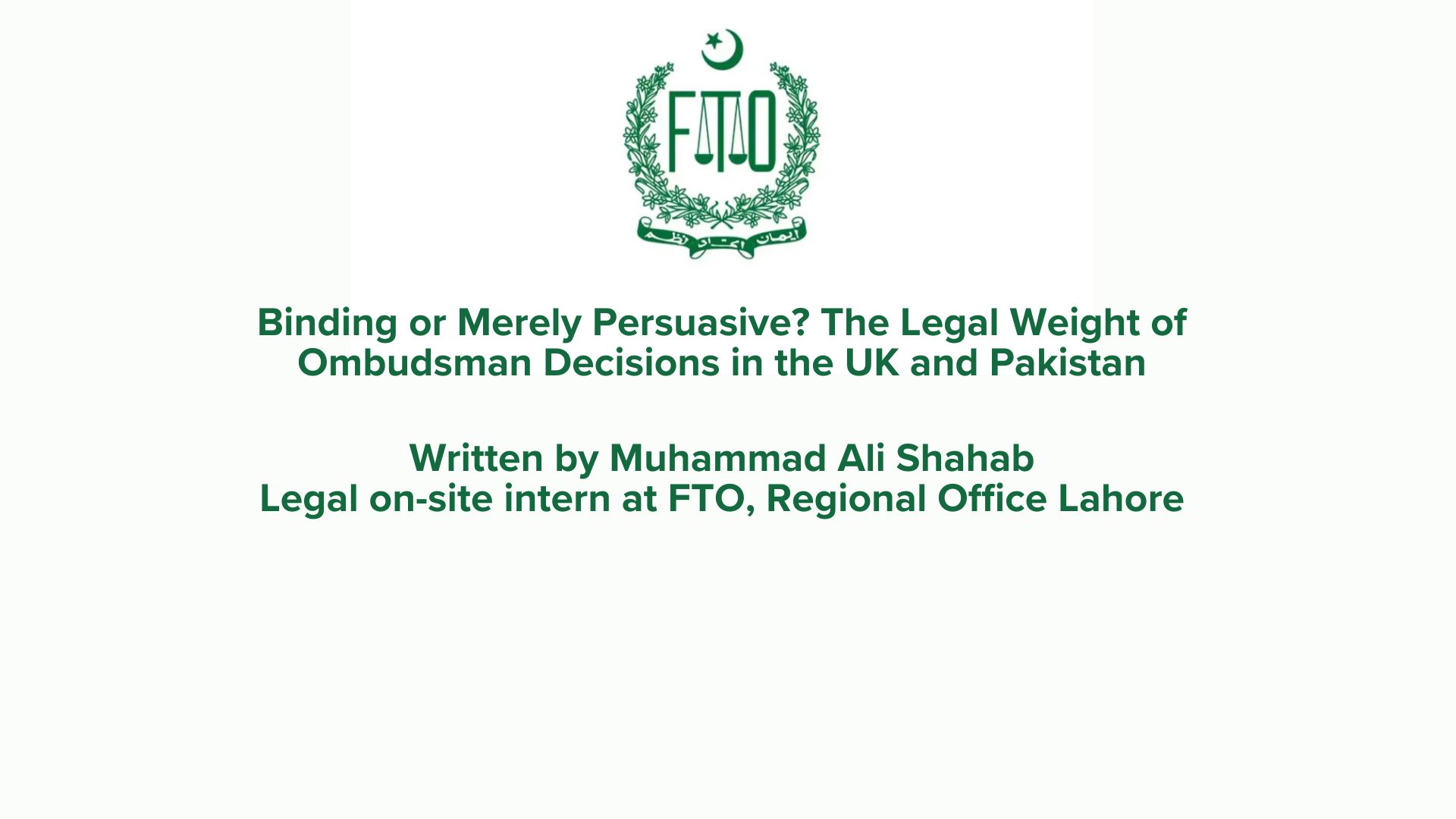Introduction: -
Ombudsmen institutions have evolved globally as key mechanisms to address maladministration, providing an alternative to traditional judicial review. These bodies are tasked with investigating complaints, promoting administrative justice and recommending remedies. However, the effectiveness of an ombudsman depends not only on its ability to investigate but also on the legal authority and enforceability of its recommendations. This article explores the legal weight of ombudsmen's decisions in two jurisdictions: the United Kingdom, through the Parliamentary and Health Service Ombudsmen (PHSO) and Pakistan, through the Federal Tax Ombudsmen (FTO). It examines whether these institutions act as legally binding authorities or remain limited to persuasive influence through political and moral pressure.
Legal Framework in the United Kingdom and Pakistan: -
In the UK, the role of the ombudsmen is governed by the parliamentary commissioner Act 1967, under which the Parliamentary and Health Service Ombudsmen (PHSO) operate. The ombudsmen are appointed by the Crown and enjoys operational independence. However, the legal structure restricts the initiation of complaints, as a complaint to the PHSO must be referred by a member of Parliament under section 5(1) of the Act. This so-called “MP filter” has been the subject of longstanding criticism, though it remains in force. While the PHSO can investigate complaints and issue detailed reports, its findings and recommendations are not legally binding. If maladministration is found and the public body fails to provide redress, the ombudsmen may lay a special report before Parliament under section 10(3). In this way, the ombudsman’s authority in the UK is closely tied to parliamentary oversight and public accountability rather than direct legal enforcement.
In contrast, the Federal Tax Ombudsmen (FTO) of Pakistan was established under the FTO Ordinance, 2000. The FTO specifically addresses maladministration by tax authorities, particularly the Federal Board of Revenue (FBR) and Customs officials. Unlike the UK model, the FTO possesses Suo moto powers, allowing it to initiate investigations independently. Furthermore, the recommendations of the FTO are binding on the department, and if they refuse to comply or fail to provide sufficient reasoning for non-compliance, then it is treated as defiance under section 12 of the ordinance. Along with this, the matter could also be referred to the President of Pakistan. Under section 11 of the ordinance, the President’s decision is final, thereby providing a quasi-executive mechanism to enforce the FTO’s findings.
The Nature of Ombudsmen Decisions: Legal Authority or Moral Persuasion?
The decisions of the PHSO in the UK are formally non-binding. Their effectiveness depends on the ombudsmen’s institutional credibility, the power of public reporting and scrutiny of parliament. Despite lacking legal force, the PHSO’s findings carry weigh when they generate media attention or political momentum. A notable example is the Equitable life case, where the ombudsmen’s finding on mal administration by financial regulators led to an extensive parliamentary debate and eventual partial redress. However, the courts have played a role in reinforcing ombudsmen decisions. In Bradley v Secretary of State for Work and Pensions (2007), the Court of Appeal held that a government department must provide “cogent reasons” for rejecting an ombudsmen’s findings. This judicially developed standard does not make the recommendations binding but raises the threshold for lawful rejection.
In Pakistan, the FTO’s recommendations are binding and benefit from a clearer institutional enforcement mechanism. When a department refuses to act on a recommendation, the matter can be escalated to the President of Pakistan, whose decision is final. This along with enforcement under section 12 creates a unique feature absent in the UK mode. The FTO’s powers are further supported by Suo moto authority, enabling it to investigate systemic issues without a formal complaint. Nonetheless, the FTO’s jurisdiction is limited under section 9(2)(b) of the Ordinance, which excludes matters related to tax assessment, classification and valuation, areas that often form the core of tax disputes. As a result in high-stakes financial cases, the FTO may be sidelined on jurisdictional grounds.
Judicial Review of Ombudsmen Decisions: -
In the United Kingdom, the judiciary has historically oscillated between deference and interference in ombudsmen decisions. Initially, in Re Fletcher’s application (1970), the Court of Appeal held that there was no jurisdiction to compel the parliamentary commissioner to investigate a complain. However, in the Balchin litigation (1997-2000), the high court and subsequently the court of appeal engaged in extensive judicial scrutiny of the ombudsman’s reports. The courts quashed several iterations of the ombudsmen’s findings for failure to consider relevant facts or provide sufficient reasoning. These interventions established the principle that ombudsmen must give reasons that address all principal and controversial issues. While such decisions improved procedural standards, they arguably undermined the independence of ombudsmen by making them susceptible to judicial second-guessing.
Judicial interference in Pakistan has been more restrained, primary based on section 29 of the ordinance, where it is clearly stated that the courts have no jurisdiction to question the validity of the decision and grant an injunction. This has led to Pakistani courts generally upholding the autonomy of the FTO and rarely interfered in its recommendation. However, courts have occasionally interfered. The case of M/S Shahzadi Polypropylene Industries v Federation of Pakistan, where the Lahore High Court passed the order that if alternate legal remedies exists then the complainant should first exhaust them.
Compliance and Enforcement in Practice: -
The compliance rate with ombudsmen recommendation varies across both jurisdictions. In the UK, department may reject ombudsmen findings, but they risk facing parliamentary scrutiny and public criticism. The “cogent reasons” test from Bradly has provided a partial legal framework for challenging such rejections, though its enforcement remains inconsistent. Ultimately, the UK ombudsmen system relied heavily on reputational and political consequences rather than legal obligations.
In Pakistan, on the other hand, enforcement is more procedural teeth and effective. If a department fails to act on FTO’s recommendation, the matter is escalated to the President or treated as defiance. This mechanism adds executive weight to the process, often promoting compliance. In practice several cases illustrate the FTO’s success in securing implementation. For example, the Orient Power Company case, the FTO’s involvement led to a joint reconciliation exercise and eventual payment of outstanding duties. However, the FTO still faces structural constraints due to its limited jurisdiction in core tax matters and the absence of a parliamentary mechanism to back its recommendation.
Comparative Assessment: -
Both the UK and Pakistan Follow a model of ombudsman governance based on soft enforcement. While neither system grants legally binding authority to ombudsman recommendations, they differ significantly in institutional design. The UK ombudsmen is integrated into parliamentary framework and relies on public scrutiny, whereas the Pakistani FTO is limited to the executive and can invoke presidential authority. Judicial oversight is more pronounced in the UK, with courts occasionally quashing or reinforcing ombudsman finding, while in Pakistan, judicial restraint is the norm unless the FTO exceeds its jurisdiction.
These differences reflect broader philosophical divergences in administrative law. The UK places emphasis on parliamentary sovereignty and judicial accountability, while Pakistan’s FTO model aligns more with bureaucratic oversight and executive finality. Both systems, however, reveal a common limitation: the inability to compel enforcement directly, making the effectiveness of ombudsman decisions contingent on political will, public pressure, or procedural escalation.
Conclusion: -
The comparison between the UK’s PHSO and Pakistan’s FTO highlights that both institutions operate on persuasive authority. While the UK relies on parliamentary scrutiny and the doctrine of cogent reasons to ensure compliance, Pakistan uses executive escalation through the President to reinforce recommendations. Judicial engagement also differs, with UK courts more willing to scrutinize ombudsman decisions, whereas Pakistani courts generally refrain unless jurisdiction is exceeded. Ultimately, the influence of ombudsman findings in both systems depends more on political will, institutional design and public accountability than on legal enforceability.

